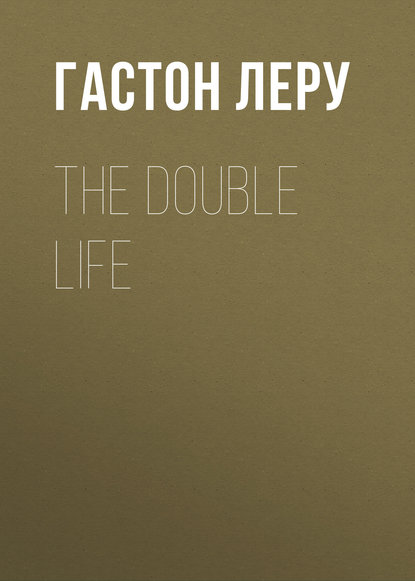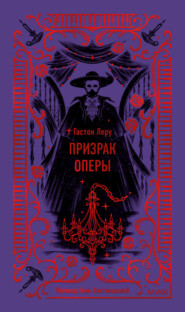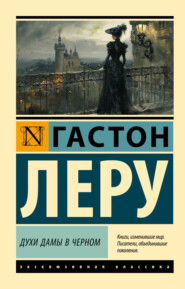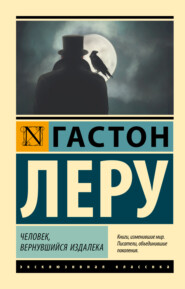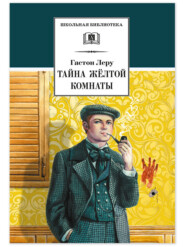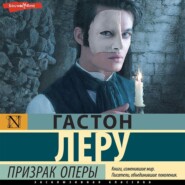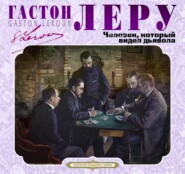По всем вопросам обращайтесь на: info@litportal.ru
(©) 2003-2024.
✖
The Double Life
Автор
Год написания книги
2018
Настройки чтения
Размер шрифта
Высота строк
Поля
“You are sure?”
“Yes, but tell me,” cried Ambrose, who could not conceal his surprise, “how is it that this document, dated 1721, could be by all visible marks in your handwriting?”
Théophraste said nothing, but getting up and putting the document back into the portfolio, he hastened out of the house.
And so here was proof enough. He could doubt it no longer. This paper, dated in the beginning of the eighteenth century, in the time of the Regents, this sheet that he had sought for in the prison, distinctly bore his own handwriting. He had written on that sheet, he, Théophraste Longuet, late maker of rubber stamps, who retired last week at the age of 41-he wrote on that sheet of paper these incomprehensible words in 1721. However, it did not want Signor Petito or Ambrose to prove it to him. He knew it himself. Everything within him cried out, “It is your paper!” And so instead of being Théophraste Longuet, son of John Longuet, master gardener to the Ferte sous Jonaise, he had been in the past some one he did not know, but who had been reborn in him. Yes, that was it, and he now had the great desire to recall having lived 200 years.
Who was he? What was his name? In which body had his immortal soul elected momentarily to live? He felt certain that these questions would not remain long unanswered. Was it true that some of the things ignored in his present existence constituted part of his past life? What was meant by certain expressions spoken in the Conciergerie? Who, then, was Simon de Anvergust, whose name had been twice repeated by his burning lips?
“Yes, yes, the name, in former times my own, his also,” wrote Théophraste in his journal, “arose from my awakened brain, and knowing who I was, I recalled the whole life lived in former years, and I read in a flash from that piece of paper all the details of a past life.”
Monsieur Théophraste Longuet, to state the matter frankly, had not arrived at the conclusion without having, in these incoherent lines, wandered before. The happenings of these days were too unusual. Imagine, he was simple-minded, a little heavy, a little foppish, he had never invented anything in his life. He was just an amiable, honest citizen, stupid and headstrong. He had no religion. He left that to the women, and without declaring his atheism, used to say: “When one dies, it is forever.” However, now he had discovered by an extraordinary incident, that one never dies. He had to support this, and in doing so declared that not even those in the business, in occult science, frequenting spirits daily, could have such palpable proof. In the end Théophraste made his resolution quickly.
This anterior existence could no longer be denied, although he knew nothing about it. In the uncertainty of his mind he could not associate the date 1721 with his visit to the Conciergerie.
However, he came to this final conclusion. In 1721 he had been confined in the Conciergerie Prison, probably as a prisoner of state. He could not admit for a second that he, Théophraste Longuet, had been shut up, even under Louis XV, as a common criminal. In a solemn moment, perhaps before being put to torture, he had drawn up this document and hidden the paper between the stones in the dungeon, and passing by there two centuries later, had found it again. This was simple enough and not the result of any supernatural inspiration. The facts themselves were enough.
Certain words of the document were in themselves quite natural and of the most momentous importance. These were “Treasure… treachery of the first of April.”
It was with these words that he hoped to discover his identity. First, he had been rich and powerful. The words about the treasure showed conclusively that the man had been rich and that he had buried his treasure. He had been powerful and had been betrayed. Théophraste had in his mind that the treason had been a memorable treason, perhaps historic-the treachery of the first of April.
Yes, all the oddities and all the mysteries of the document left at least a glimpse of something certain: that he had been a great personage, that he had buried his treasures; and that after having buried them mysteriously, more mysteriously still revealed their existence, at the price of much cunning; perhaps at the price of his own blood. Without doubt those tinted words had been written with blood.
Later he proposed to ask a distinguished chemist to examine it. The treasures belonged to him, and if necessary he would use this document to establish his right to them.
Théophraste was not rich. He had retired from business with a modest little income. He had a comfortable little house with a garden and bowling alley. However, this was little, with the somewhat extravagant tastes of Marceline, and so the treasure would be most acceptable. He therefore applied himself diligently to the research.
It must be said, though, to his credit, that he was much more puzzled by the mystery of his personality than by the mystery of the treasure, and that he resolved to temporarily suspend his research until the time when he could at least give a name to this personage that he had been-Théophraste Longuet in 1721. That discovery which interested him most came to be in his mind the key of all the others.
That which astonished him most was the sudden development of what he called his “historical instinct,” the instinct which had been deficient in him all his life, but which had been revealed to him with the suddenness and force of a clap of thunder in the depths of the Conciergerie. In one moment, the Other, as he used to say in conversing of this great 18th-century personage, had possessed him. It was the Other who had found the document; it was the Other who had cried out in the Conciergerie; it was the Other who had called to Simon l’Anvergust, and since the Other had disappeared, Théophraste did not know what had become of him. He sought him in vain; he examined himself; he searched his very soul.
Before this adventure Théophraste had no curiosity about the beginning or ending of things, he had not wasted time in wondering over philosophical mysteries; in his vanity he had always shrugged his shoulders at such things. However, now things were different; here was a quiet citizen, with little scientific knowledge, who had to prove that a manufacturer of India rubber in the year 1899 had been shut up in a dungeon after having buried treasures in 1721. But the revelation of this extraordinary fact had come to him spontaneously and remained so fixed in his mind that he resolved to probe the matter to the bottom.
His instinct abandoned him momentarily and he would search books and discover who this powerful, rich person was who had been betrayed on April 1st; which April 1st? This remained to be determined. He haunted the libraries from that time on. He marshaled before him the Premiers of the Kingdom. He found nothing to give him a clue. Some dukes and peers, some illustrious generals, some great financiers, a few princes of the blood. He stopped an instant at Law, but he was too dissipated; at Maurice de Saxe, who ought to have won the Battle of Fontenoy; at the Count du Barry, who had had the most beautiful mistress in Paris. He feared that perhaps he had been the Count de Charolais, who distinguished himself by his debauches, and killed the thatchers on the roofs by shooting at them. He was forty-eight hours the Cardinal of Palegria, but was disgusted when he learned that his Eminence had been a farm hand for the Duchess of Maine. It was refreshing to find in some corner of history a sympathetic count or lord that the writers of the epoch had adorned in engaging colors and on whom they had bestowed some virtues. But Théophraste soon saw that all these would have to be abandoned. For none of them had the principal qualifications of having been shut up in the Conciergerie in 1721, or having been betrayed on an April 1st.
However, in the Journal of the Barber, he discovered a bastard of the Regent, about whom were some startling facts which precipitated him into a state of great excitement.
Before entering into the details, however, of this discovery, we will return to the doings of Marceline and M. Adolphe Lecamus.
CHAPTER IV
Some Philosophy and a Song
LET us leave Paris awhile and return to the little estate on the banks of the Marne, which Théophraste generally moved to with the first rays of the July sun. This year he was to go there before Marceline and his friend, Adolphe, who had been commissioned to survey the timbers on some lands elsewhere. Thus these last few days he could spend alone in security and peace to attend to this unusual treatise which his new position in the world had given him.
The name of the house was “Villa Flots d’Azure.” Théophraste had given it this name against the wishes of Adolphe, who protested that the name was for a villa near the sea. He had replied with logic that he had often gone to the Preport, and that he had always seen the sea green; that he knew the Marne, and that on account of the reflected blue sky the water seemed blue. Do they not say “the beautiful blue Danube”? It was not only the ocean that had blue waves, so he did not see why he should not call his villa on the Marne “Villa Flots d’Azure.”
That day was the anniversary of their marriage. Théophraste was very fond of Marceline, and these anniversaries were always the occasion for much merry-making. Marceline also loved Théophraste, and saw no reason why she should not like Adolphe equally as well, whereas, on the other side, Adolphe adored Marceline and would have died for Théophraste. On reflection, the name “Villa Flots d’Amour” would have been more appropriate than “Villa Flots d’Azure,” such harmony existed therein.
Théophraste shook Adolphe’s hand effusively. He complimented his wife on her beauty. He had his green umbrella that day, and in making his congratulations twirled it in a fashion, as he thought, resembling the manner in which they used canes in the beginning of the eighteenth century. He was not a vain person, but he knew by this scientific miracle that he had been a great man two hundred years ago, and he felt that he should convey the impression that he had moved among great people and affairs.
It was their custom upon their return to their country house to invite a few friends to a party to celebrate the occasion. Upon this occasion Théophraste was at his best. He was in high spirits, and while passing the good word to the gentlemen, made flattering speeches to the ladies. The table was set in the garden under a tent where the guests assembled. After a while the conversation turned to the latest doings in angling. M. Lopard had caught a trout of three pounds; old M. Tartoush had cast his line on Sunday-having caught nothing, complained that people made too much noise shooting during the week, and drove the fish from these waters. All joined in the conversation and gave their experiences except M. Théophraste.
He kept silent. He found the topic too commonplace and felt a desire to raise its level. He wanted it to drift into some subject related to that preoccupying his mind. After awhile he was able to get Adolphe interested in the subject of ghosts. From ghosts the conversation led on to spiritualism. One lady knew a somnambulist and related some strange stories which were calculated to work upon the imagination of the company. Adolphe, upon this, explained the spiritualistic point of view of the phenomena of somnambulism, and cited well-known authorities. He seemed quite in his element, and finally reached the point desired by Théophraste, the transmigration of souls and reincarnation.
“Is it possible,” said Marceline, “that a soul comes back to live in its body? You have often told me so, Adolphe, but it seems to me that one’s reason strongly repulses such an hypothesis.” “Nothing is lost in Nature,” replied Adolphe, positively. “Neither the soul nor the body. All is transformed, the soul as well as the body. The reincarnation of souls at the end of a century is a doctrine which goes back to such great antiquity that the ancient philosophers do not deny it.”
“If one’s soul returned to a body,” said Marceline, “one would surely know it.”
“Not always,” said Adolphe, “but sometimes.” “Ah, sometimes?” asked Théophraste, who was by this time becoming intensely interested.
“Yes, there are cases. For instance: Ptolemy Caesar, son of Caesar and Cleopatra, who was king of Egypt before Christ, remembered well to have been Pythagoras, a Greek philosopher, who lived 600 years before.”
“Impossible!” cried the ladies, and the gentlemen smiled skeptically.
“You need not laugh, gentlemen. It is impossible to be more serious. Our actual transformation, which is the final word in science, is in full accord with the theory of reincarnation. What is transformation except the idea that living things transform themselves, progressing one into another? Nature presents herself to us under the aspect of a spark, elaborately perfecting without ceasing to create, to attain an ideal which will be the millennium. Whatever Nature does for the body she does for the soul. It can be proved, for I have studied this side a great deal, and it is the original of all sciences.
Monsieur Adolphe was not understood by the company, a fact of which he was inwardly proud. He liked to feel a superiority of intellect, and often he would raise the conversation above the level of his audience just to gratify his vanity. He touched on many points which only need be referred to lightly here in order to convince skeptics that the extraordinary history of Théophraste is founded on a most scientific basis.
“The transmigration of souls was taught in India,” said Adolphe; “the cradle of the genus human, then in Egypt, then in Greece. They chanted its mysteries in the name of Orpheus. Pythagoras, who continued the teaching, did not admit with the philosophers on the banks of the Ganges that the soul traveled over the cycle of all animal existence. He made it come back, for example, into a pig.”
“There are some men,” said Madame Beulie, “who still have the souls of pigs.”
“Without doubt,” said Adolphe, smiling; “but what Pythagoras says is that we must not conclude from that, that pigs have the souls of men. Plato also adopts this doctrine. It is the first which gave in the Phidon the proof that souls do not exile themselves forever and that they come back to animate bodies anew.”
“Oh, if we could only get proof of that it would be nothing for me to die,” declared old Mlle. Tabouret, who had a mortal terror of dying.
“Here are the proofs,” continued Adolphe. “They are two in number. One is taken from the general law of Nature, the other from human nature. First, Nature is governed by the laws of contraries, and from that we see that while death succeeds life, all would end by being absorbed in death, and Nature would one day come to an end like Endymion. Therefore I say that we exist after death.
“Secondly, if after consulting the general laws of Nature we turn to our own minds, we will find there the same dogma attested by the fact of resemblance. ‘To learn,’ said Plato, ‘is nothing but to recollect. Since our souls learn, they must have a resemblance. What does it recollect except to have lived, and to have lived in another body? Why can we not believe that in leaving the body while it is animate at this time it can animate several others in succession?’ I quote Plato literally,” remarked Adolphe.
Then he passed from Plato to a modern authority. “Charles Fournier has said: ‘Where is the old man who has not truly wished to be born again, and to use in another life the experience he has acquired in this?’ To pretend that that desire ought not to be realized is to admit that God can deceive us. We ought then to recognize that we have lived previous to being what we are, and that several other lives await us. All these lives, to the number of eight hundred and ten, are distributed between five periods and embrace a span of eighty-one thousand years. Allan Hardai reckons that the soul returns to another body after two or three thousand years unless we die a violent death. Then it is quite possible one can be reincarnated after two hundred years.”
Adolphe had by this time drawn all around him and became the center of attraction by his entertaining remarks. Théophraste had sat open-eyed, listening intently, and upon hearing the last remark thought “That is well. They may have hung me; so if I did not die that way, they may have got rid of me by some other death more in keeping with my station in life. Nevertheless,” he thought, “if all these people here could only realize that they had a prince of the royal blood among them, they would be very much astonished, and be filled with respect. But no, he will still be Théophraste Longuet, manufacturer of rubber stamps.”
Champagne was brought, and soon the air rang merrily with general chatter and the explosion of corks. It was then that Marceline turned around to Théophraste and begged him to sing the song which he was accustomed to sing on the anniversary of their marriage. He had sung it the day of their wedding, and on account of its beauty they had adopted it as their wedding song. It was Lissette de Baranger.
However, to the consternation of Marceline and all the guests, instead of singing the song, he rose, threw his napkin on the table and said to her in that strange voice which they heard at the Conciergerie:
“As thou wishest, Marie Antoinette, I can refuse thee nothing.”
“Oh, my God,” cried Marceline. “Hear what he called me in that strange voice!”
The guests were obviously uncomfortable, and did not know what to make of his peculiar behavior. The song was a vulgar song of the Regency period, and certainly not for such a gathering as was at this party. He sang it with the old French air:
Tou joli belle mimiere—
Tou joli, moulin.





